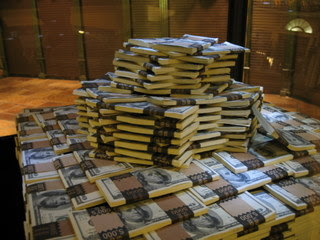やられたー
ついに私のブログの存在がばれたかも知れません。。。。
プライバシーを保護しつつブログを書くのは難しい。。。
WASHINGTON -- Chief executives at eight banks and securities firms that have gotten $165 billion in federal aid were barraged by U.S. lawmakers, who showed little patience for a charm offensive aimed at defusing ire over pay and lending.
During Wednesday's seven-hour hearing before the House Financial Services Committee, Rep. Maxine Waters (D., Calif.) referred to the CEOs, sitting in alphabetical order at a long table, as "captains of the universe."
When Bank of America Corp. Chairman and CEO Kenneth Lewis responded, "corporals of the universe," Rep. Waters looked at him blankly. "Did you raise your credit-card rates?" she demanded.
It was a typical moment in a hearing that underscored how big-bank CEOs have become lightning rods for the anger and misery fueled by falling home prices, rising unemployment and the deepening recession. From Goldman Sachs Group Inc. Chief Executive Lloyd Blankfein to John Stumpf of Wells Fargo & Co., the eight executives endured relentless questions that included being forced to recite their salary, bonus and stock compensation in a hearing meant to assess the Troubled Asset Relief Program.
In 2006 and 2007, the eight executives got total compensation of $401 million, according to securities filings. The combined stock-market value of their companies has plunged 69% since the Dow Jones Industrial Average peaked in October 2007.
"It is essential if we are to reverse the economic negativism that we now confront that we get the system of extending credit back to its fullest operation," said House Financial Services Chairman Barney Frank (D., Mass.).
Committee members did little to hide their ire about what they perceive as wasted aid from the government. Vikram Pandit, chief executive of Citigroup Inc., which got $45 billion in taxpayer-funded capital, apologized for plans by the New York bank to buy a corporate jet. The order was canceled last month under pressure from the Obama administration.
Mr. Pandit, who became CEO at Citigroup in December 2007, also vowed to take $1 a year in salary until the company returns to profitability. Citigroup has posted five quarterly losses in a row, including a net loss of $8.3 billion in the fourth quarter.
Anticipating tough questions about pay and perks, James Dimon, chairman and chief executive of J.P. Morgan Chase & Co., took the Acela, Amtrak's high-speed train, and stayed overnight at Washington's Park Hyatt hotel. He bumped into Bank of New York Mellon Corp. CEO Robert Kelly at breakfast. Mr. Blankfein and John Mack, Morgan Stanley's chief executive, flew commercial flights, but Mr. Blankfein stayed at a Ritz-Carlton hotel. Mr. Pandit spent hours cramming for the hearing.
"You come to us today on your bicycles, after buying Girl Scout cookies and helping out Mother Teresa, telling us: 'We're sorry. We won't do it again,' "said Rep. Michael Capuano (D., Mass.). "America doesn't trust you anymore."
![[The chief executives of banks that have received federal-government aid testified Wednesday before the House Financial Services Committee, including, from left: Lloyd Blankfein of Goldman Sachs, James Dimon of J.P. Morgan Chase, Robert Kelly of Bank of New York Mellon, Kenneth Lewis of Bank of America, Ronald Logue of State Street, John Mack of Morgan Stanley, Vikram Pandit of Citigroup and John Stumpf of Wells Fargo.]](http://s.wsj.net/public/resources/images/NA-AV854_BANKCE_F_20090211164222.jpg) Reuters
Reuters

0 Comments:
Post a Comment
Subscribe to Post Comments [Atom]
<< Home